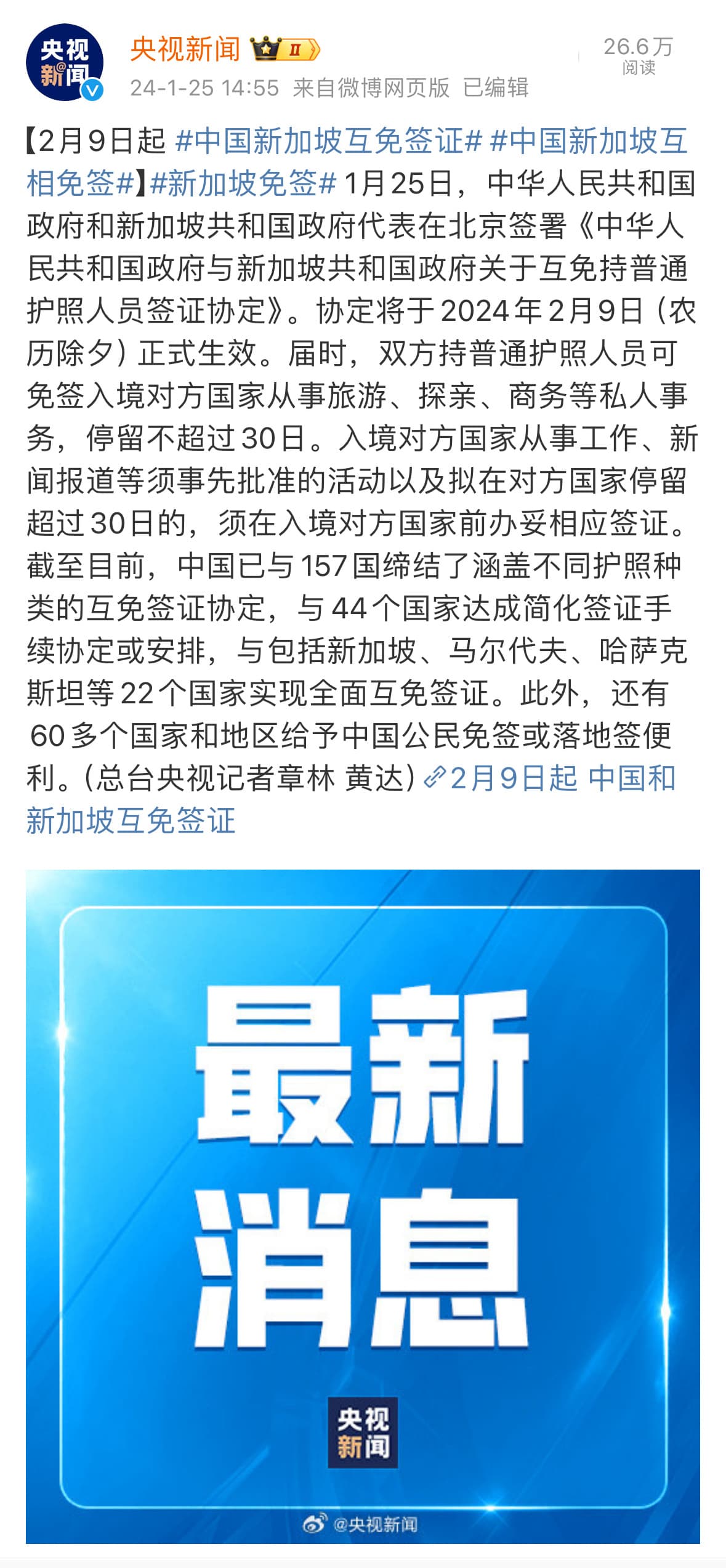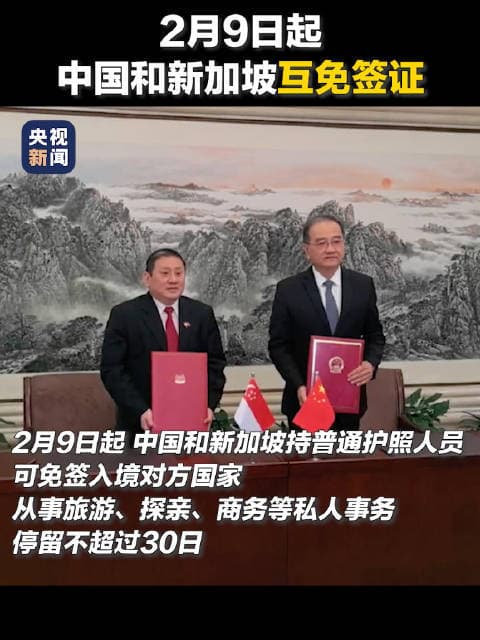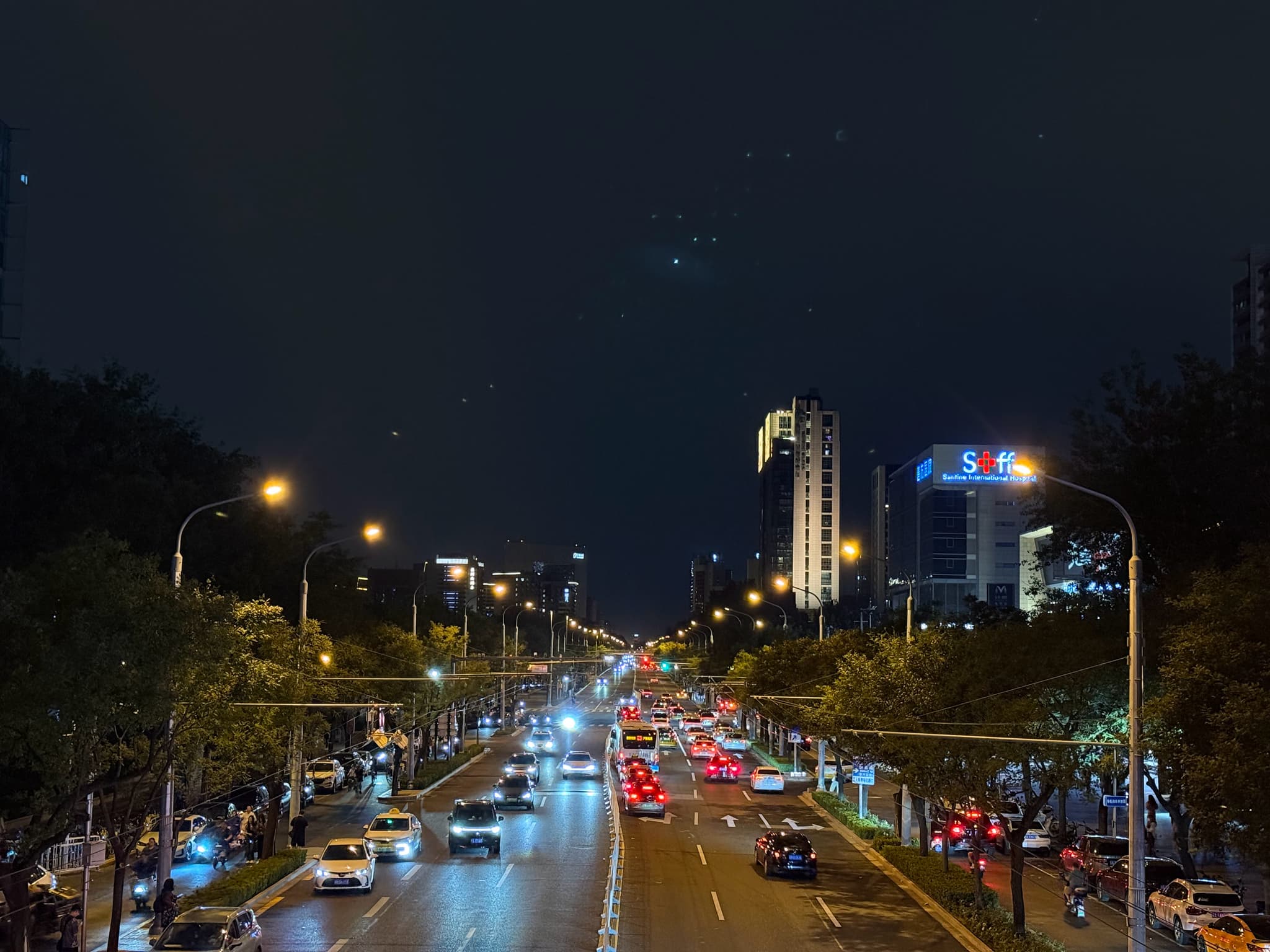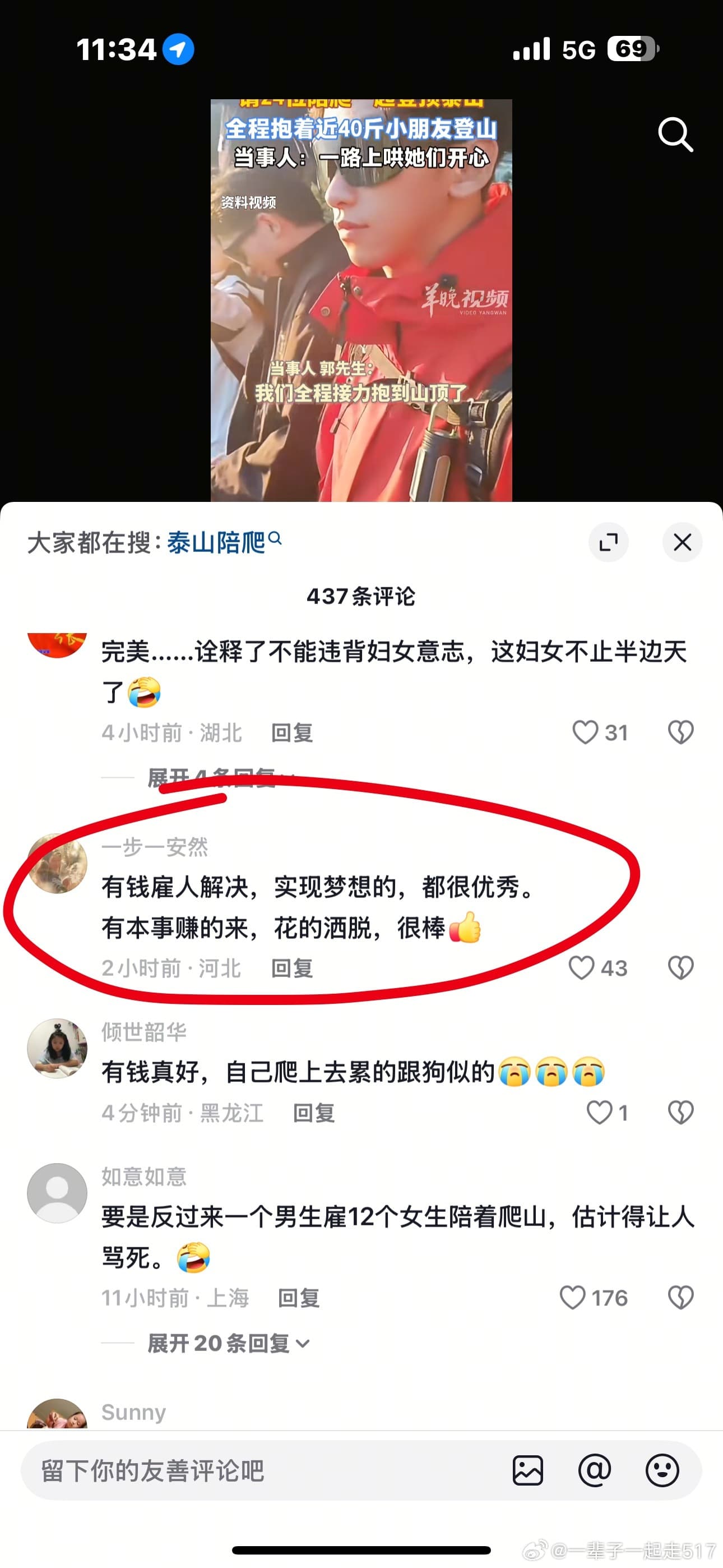Visa-Free Agreement Between Singapore and China Sparks Mixed Reactions on Weibo: Wang Junkai's Tweet Ignites Debate on Future of Sino-Singaporean Relations
On February 9th, Singapore and China signed a mutual agreement to allow visa-free entry for citizens of both countries. The agreement, which is set to take effect on the 2024 Lunar New Year, will allow citizens of both countries to enter and stay in the other for up to 30 days without the need for a visa.

23 March 2024
The news of this agreement has been met with mixed reactions on Weibo, China's popular social media platform. While some netizens have expressed excitement at the prospect of being able to travel to Singapore without the need for a visa, others have expressed concern over the potential impact of the policy.
One of the most prominent voices in the conversation has been Wang Junkai, a Chinese singer and actor who is a frequent visitor to Singapore. In response to the news, Wang Junkai tweeted "Good enough, I said enough, said a sentence for a lifetime, don't pay too much attention to my youth, more attention to my present." This tweet, which has received over 80,000 likes and 21,000 retweets, has sparked a flurry of discussion and debate amongst Weibo users.

Some users have expressed their excitement at the prospect of being able to visit Singapore more frequently now that the visa-free policy is in place. One user, with the username Singapore Free Visa Beneficiary Wang Junkai, commented "Can go home more frequently!" in response to Wang Junkai's tweet.
This post has received over 10,000 likes and 2,000 retweets, as well as hundreds of comments from Weibo users. However, not all users are as excited about the new visa-free policy. Some have expressed concern over the potential impact of the policy on Singapore's infrastructure and environment. One user, with the username X, commented "Singapore's new visa-free policy is a mistake. It will only lead to more congestion and pollution in the country." This post has generated over 10,000 likes and 2,000 retweets, as well as hundreds of comments from Weibo users.
Despite the mixed reactions, the news of the visa-free policy has also generated discussion about Wang Junkai's career and the impact of celebrity culture in China. One user, with the username Good Enough, shared a video of Wang Junkai saying "please, I'm from Singapore" and tweeted "Enough, I said enough, said a sentence for a lifetime, don't pay too much attention to my youth, more attention to my present." This tweet has received over 10,000 likes and 2,000 retweets, as well as hundreds of comments from Weibo users.
In response to the backlash, Wang Junkai's management company, TFBOYS-Wang Junkai, tweeted "Enough, I said enough, said a sentence for a lifetime, don't pay too much attention to my youth, more attention to my present." This tweet has generated over 10,000 likes and 2,000 retweets, as well as hundreds of comments from Weibo users.
Despite the controversy, it is clear that the visa-free policy between Singapore and China is a significant development that will have a major impact on the relationship between the two countries. Only time will tell how this policy will be received by the public, but one thing is certain: it has already sparked a lively and ongoing conversation on Weibo. The agreement between Singapore and China to allow visa-free entry for citizens of both countries has been met with mixed reactions on Weibo.
While some users have expressed excitement at the prospect of being able to travel to Singapore without the need for a visa, others have expressed concern over the potential impact of the policy. The announcement of the visa-free policy has also generated discussion about Chinese singer and actor Wang Junkai, who is a frequent visitor to Singapore.
Wang Junkai tweeted "Good enough, I said enough, said a sentence for a lifetime, don't pay too much attention to my youth, more attention to my present." in response to the news, and this tweet has sparked a flurry of discussion and debate amongst Weibo users. Some users have expressed their excitement at the prospect of being able to visit Singapore more frequently now that the visa-free policy is in place.
However, others have expressed concern over the potential impact of the policy on Singapore's infrastructure and environment. Despite the controversy, the visa-free policy between Singapore and China is a significant development that will have a major impact on the relationship between the two countries. Only time will tell how this policy will be received by the public, but one thing is certain: it has already sparked a lively and ongoing conversation on Weibo. In conclusion, the visa-free policy between Singapore and China is a significant development that will have a major impact on the relationship between the two countries. While the policy has been met with mixed reactions on Weibo, it is clear that it has already sparked a lively and ongoing conversation on the social media platform. The agreement between Singapore and China to allow visa-free entry for citizens of both countries has been met with mixed reactions on Weibo. While some users have expressed excitement at the prospect of being able to travel to Singapore without the need for a visa, others have expressed concern over the potential impact of the policy. The announcement of the visa-free policy has also generated discussion about Chinese singer and actor Wang Junkai, who is a frequent visitor to Singapore.

Wang Junkai tweeted "Good enough, I said enough, said a sentence for a lifetime, don't pay too much attention to my youth, more attention to my present." in response to the news, and this tweet has sparked a flurry of discussion and debate amongst Weibo users. Some users have expressed their excitement at the prospect of being able to visit Singapore more frequently now that the visa-free policy is in place.
However, others have expressed concern over the potential impact of the policy on Singapore's infrastructure and environment. Despite the controversy, the visa-free policy between Singapore and China is a significant development that will have a major impact on the relationship between the two countries. Only time will tell how this policy will be received by the public, but one thing is certain: it has already sparked a lively and ongoing conversation on Weibo. In conclusion, the visa-free policy between Singapore and China is a significant development that will have a major impact on the relationship between the two countries. While the policy has been met with mixed reactions on Weibo, it is clear that it has already sparked a lively and ongoing conversation on the social media platform. It remains to be seen how this policy will be implemented and received by the public, but one thing is certain: it is a significant development that will shape the relationship between Singapore and China for years to come. The agreement between Singapore and China to allow visa-free entry for citizens of both countries has been met with mixed reactions on Weibo, a popular social media platform in China. While some netizens have expressed excitement at the prospect of being able to travel to Singapore without the need for a visa, others have expressed concern over the potential impact of the policy.
One of the most prominent voices in the conversation has been Wang Junkai, a Chinese singer and actor who is a frequent visitor to Singapore. In response to the news, Wang Junkai tweeted "Good enough, I said enough, said a sentence for a lifetime, don't pay too much attention to my youth, more attention to my present." This tweet has sparked a flurry of discussion and debate amongst Weibo users, with many expressing their excitement at the prospect of being able to visit Singapore more frequently.
However, not all users are as excited about the new visa-free policy. Some have expressed concern over the potential impact of the policy on Singapore's infrastructure and environment. One user, with the username X, commented "Singapore's new visa-free policy is a mistake.
It will only lead to more congestion and pollution in the country." This post has generated over

